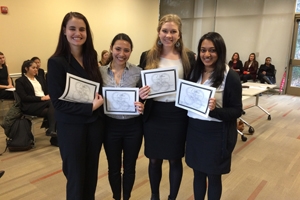Social Sciences
2016 AU Global Health Competition: Solving Real-World Problems

What would you do if you ran an international nonprofit organization and just received a $500,000 grant to address the health, economic, and lifestyle issues associated with cardiovascular disease, obesity, cancer, diabetes, and other non-communicable diseases (NCDs) in Caribbean nations?
This was the question confronting six teams on February 24 in AU's 2016 Intramural Public Health Case Competition, sponsored by the Department of Health Studies and the College of Arts and Sciences. Each team was given the "case" details two days before the competition. They had to research the issues, develop strategies, and prepare an action plan.
The teams then presented their plans to five judges: Lauren Shweder Biel, executive director of D.C. Greens; Maria Alva, health economist at RTI International; Mike James, corporate fitness director at the World Bank; and Lynda Honberg, retired captain, US Public Health Service.
"The event was a great success," said Jolynn Gardner, director of AU's Public Health Program. "All six interdisciplinary teams presented very innovative, well-researched strategies to address the case. The judges commented on how impressed they were with all of the presentations."
The Challenge
The teams were all presented with the following challenge:
Your team represents a nonprofit agency, Health Solutions, which provides consulting services on public health interventions. Your agency's work has been utilized in a variety of settings around the globe and past clients include ministries of health, healthcare systems, and other nongovernmental agencies. Your firm's specialty is providing innovative prevention and primary intervention strategies in large-scale and complex environments.
Health Solutions has just been awarded a $500,000 two-year grant by the Pan American Health Organization (PAHO) to develop new, innovative approaches to address the health, economic, and lifestyle issues associated with the increasing burden of non-communicable diseases (NCDs) in the countries comprising CARICOM, or the Caribbean Community. Your team may choose to focus on any sector, community, or country within the region and may utilize any feasible strategies.
The Winning Team
The first-place team created One Life Mandeville, with the following mission: "One Life Mandeville seeks to facilitate a sustainable noncommunicable disease prevention program through existing faith-based organisations in the city of Mandeville, Jamaica. Our goal is to improve NCD awareness and provide health education to those who carry the highest economic burden of NCDs and benefit the least from existing government resources."
One Life Mandeville would deliver a three-pronged intervention to the citizens of Mandeville: health education programs taught by local community health workers, microfinance grants for social entrepreneurship endeavors, and community health events. The team also proposed replicating the program in other communities across Jamaica and the Caribbean region.
"The winning team's solution stood out: they presented a stakeholder analysis and evaluated strengths, weaknesses, opportunities, and threats. They prepared a logic model, and thoroughly researched a feasible and practical strategy to address the issues of the case," said Gardner. "Additionally, they based their approach on solid theory. They created a very thorough evaluation plan, which directly reflected the desired outcomes. The winning strategy also reflected the reality of the need to engage the local community in assessment of needs and development and delivery of interventions."
The One Life Mandeville Project team, which won a $1,000 prize, included:
- Caroline Sell (BA French studies, BS public health '16)
- Alexa Edmier (BS public health, minor in psychology '16)
- Madison Hayes (BS public health, minors in biology and international relations '16)
- Shreya Veera (BS public health, minors in biology and statistics '16)
The Runner-Ups
Gardner praised the work done by all the teams. "The second and third-place teams also based their strategies on sound theory and feasible goals," she said. "They also presented very creative ideas and expertly utilized logic models to support their approaches."
Second Place Team ($500 Prize)
- Rain Freeman (BS public health '18)
- Morgan Taylor (BS public health '17)
- Carly LaRoche (BS environmental science '18)
- Lily Zigo (BS public health '18)
- Shyheim Snead (BA political science '18)
Third Place Team ($300 prize)
- J.I. Cruz (CAS '19)
- Casey Culhane (CAS '19)
- Meredith Bartley (SOC '19)
- Colby Beach (CAS '19)
- Sammie Paul (CAS '19)
